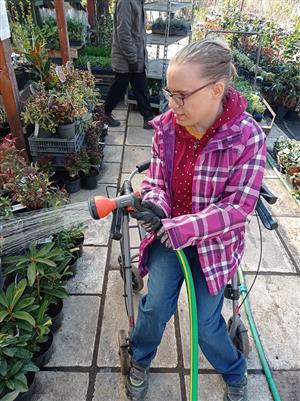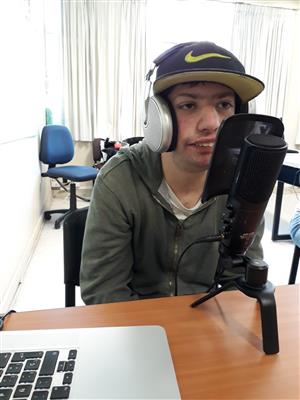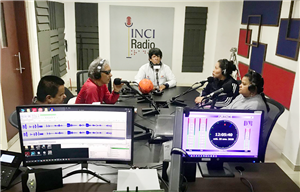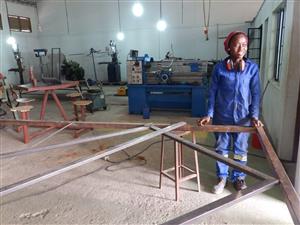Search Results
Search
Filter results
Advanced Filters
Your search returned 562 Solutions
-

Youth House: Empowering vulnerable young people with disabilities not in education, employment, or training(NEET)
Salva Vita Foundation, Hungary: Empowers NEET youth through activities like animal-assisted therapy and job coaching. From 2018 to 2022, supported over 140 participants, with around 70 finding employment.
Youth House, Hungary -

A three-year vocational training programme for students with intellectual disabilities
The "Diploma in Working Skills" is a three-year programme for people with learning difficulties to develop employment skills. Both professional and social competences are taught during the training. The programme takes place on the university campus and students have access to all extracurricular activities on site.
Andres Bello University, Socio-labour training programme in a university setting, Chile -
Combining architecture, universal design and social work, RIOinclui offers accessible housing for children and youths with disabilities living in poor conditions in the city of Rio de Janeiro. A full network of local support is provided.
Targeting physical and social mobility at the same time, the project goes beyond architectural interventions: reasonable accommodation for the beneficiaries and their care-givers is created. The whole family is empowered to benefit from statutory social welfare; a network of local support is provided.
RIOinclui - Social Work of the City Rio de Janeiro, At the nexus of architecture and social work in Rio, Brazil -

Government-sponsored radio station targeting blind and visually impaired listeners
La Radio Incluyente is a radio station in Colombia with programmes targeted towards the blind and visually impaired. The government-financed station has 30,000 Spanish speaking listeners in almost 100 countries.
INCI - National Institute for the Blind, INCIRadio La Radio Incluyente, Colombia -
Post-secondary inclusion: a path to employment
IPSE develops inclusive post-secondary education opportunities for individuals with developmental disabilities. The initiative has a proven track record, resulting in vastly superior rates of employment for adults with developmental disabilities in a broad array of jobs and careers with less dependency on human services.
Alberta Association for Community Living, Post-secondary inclusion: a path to employment, Canada -
NVDA is a free, fully functional, portable screen reader for Microsoft Windows that allows blind and vision-impaired persons across the world access to computers at no greater cost than their sighted peers.
Thanks to NVDA, blind and vision-impaired people can participate in education, the workforce and aspects of daily living that were previously impossible or difficult to access such as reading, shopping, banking and social networking. In 2013 NVDA was the only fully functional, multi-lingual, free download available to everyone.
NV Access Limited, Portable screen-reader, free of charge, Australia -
Improving research and training on urban accessibility and Universal Design
The project involves publishing research on Universal Design, improving the curricula and training of planners and surveyors undertaking university study, plus assessing cities on accessibility criteria. As of 2019, two studies and one paper have been published, and four university courses have been modified.
University of Belgrade, Faculty of Architecture, Teaching Universal Design, Serbia -
Using iPads to create multiple information channels
The project developed interactive textbooks on vocational subjects designed to include students with learning disabilities, and that can be used on iPad. The subject matter is presented in multiple ways and offers a variety of learning styles. The project also offers customized tools to help students with dyslexia.
CLE - Leonardo Education Center, Italy -
Enfranchising People with Disabilities in Zimbabwe
The program has sought to secure the inclusion of people with disabilities in Zimbabwe’s governance systems by advocating for their accessibility to polling stations. The program also aimed at ensuring proportional representation of people with disabilities in decision-making bodies or a quota system in employment.
Jairos Jiri Association, Zimbabwe -

Making training centres accessible
With the advice of Light for the World, Young Africa Mozambique has adapted their already existing training schedules by reducing the barriers to enable young people with disabilities to study with their peers. Two new accessible hostels were constructed to accommodate 128 young people, one existing hostel was renovated.
Young Africa, Mozambique
- Page 1
- Page 2
- Page 3
- Page 4
- Page 5
- Page 6
- Page 7
- Page 8
- Page 9
- Page 10
- Page 11
- Page 12
- Page 13
- Page 14
- Page 15
- Page 16
- Page 17
- Page 18
- Page 19
- Page 20
- Page 21
- Page 22
- Page 23
- Page 24
- Page 25
- Page 26
- Page 27
- Page 28
- Page 29
- Page 30
- Page 31
- Page 32
- Page 33
- Page 34
- Page 35
- Page 36
- Page 37
- Page 38
- Page 39
- Page 40
- Page 41
- Page 42
- Page 43
- Page 44
- Page 45
- Page 46
- Page 47
- Page 48
- Page 49
- Page 50
- Page 51
- Page 52
- Page 53
- Page 54
- Page 55
- Page 56
- Page 57